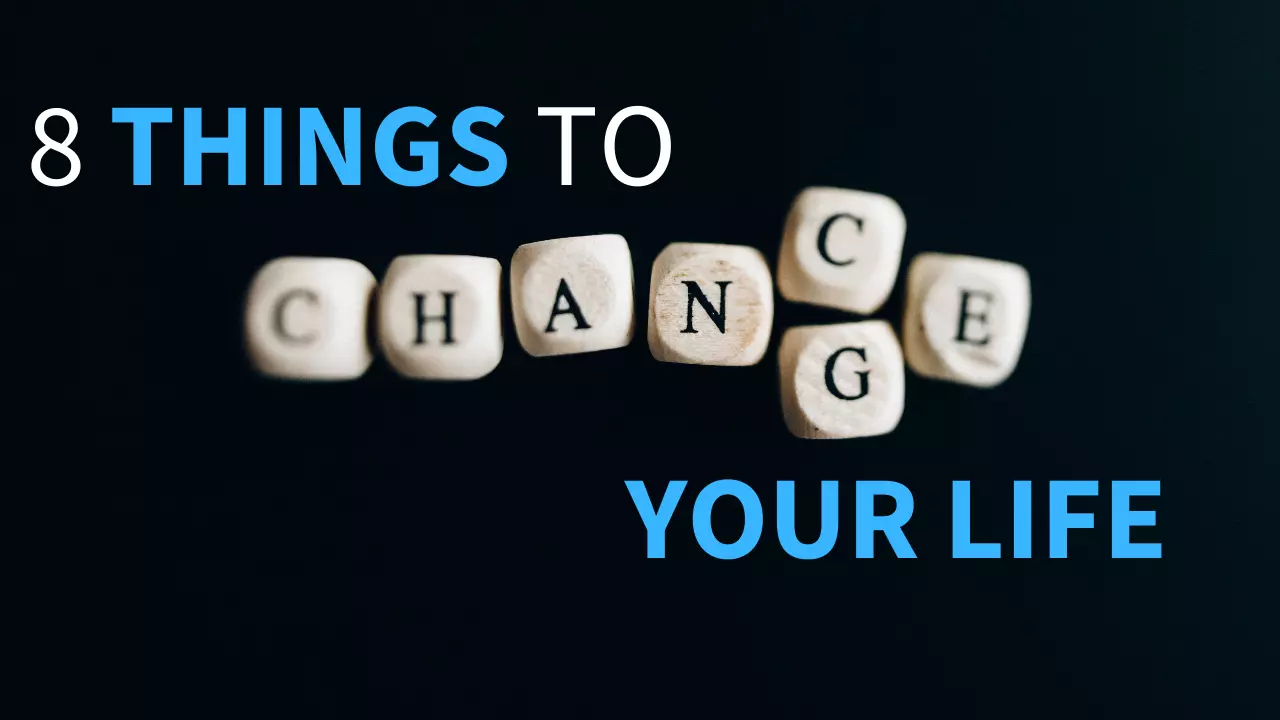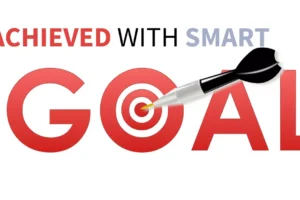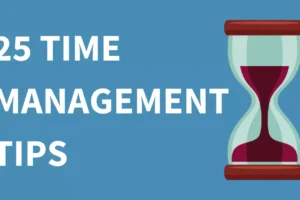
8 Things You Can Do Right Now to Change Your Life
Do you want to make an impact in the world? This isn’t the first time you’ve felt this way. Countless millions of people wish for a brighter future. Greater money, more independence, a larger house, weight loss, meeting the love of their life, or any number of other factors could be the catalyst.
Even still, we all know that change is difficult in any case. We’re often set in our ways, unable to break free from old habits and patterns. Some behaviours are so deeply embedded that they’ve been a part of our lives for decades, not just years. You can, however, teach an old dog new tricks as long as the old dog is willing to learn.
If you actually want to change, you must first comprehend the psychology of the mind and how it functions. The fact that 95% of what you think, say, and do is habitual explains why change is so difficult. It’s completely automated and pre-programmed.
Change is Difficult
Consider it this way: At 40 bits per second, the conscious mind, which is the part of the mind that provides us free will and creativity, processes facts from the environment. The non-conscious mind, on the other hand, which controls much of our daily activities, analyzes data at a rate of 40 million bits per second.
Consider how difficult it would be to swim up Niagara Falls from the bottom. Isn’t it virtually impossible? I mean, how does one go up against something so formidable? Consider trying to go the other way in the Colorado River’s most treacherous whitewater.
The point I’m making is that change is difficult. It’s not an easy task. So don’t hold your breath. However, there is a key principle I want you to grasp that will make change a lot simpler for you. I’m not going to call it a ruse. However, it is a hack in every sense of the word.
Understanding the Process of Habit Formation
To understand how habit formation works, you must first understand how it works. Consider behaviours in this light. Consider a cruise ship anchored in a port somewhere on the globe. A mooring line is used to dock the cruise ship, which is large and very heavy.
Those enormous ropes are mooring lines. I’m sure you’ve seen them before. They’re around the size of a human head, and occasionally considerably larger. The fact is that each portion of these gigantic mooring lines is made up of strings and threads.
You can see the individual ropes, which are made up of individual threads, if you look closely. Those mooring lines have thousands of separate threads. This is my point. Your habits are the result of a series of acts over time.
They don’t appear out of nowhere. It takes months, if not years, for them to truly settle in. But once those habits are established, you can expect they’ll stick around for a long time. Unless, of course, you take steps to rectify the situation. However, don’t expect to go against the non-conscious mind in the conventional sense.
Many people attempt to quit cold turkey. It also doesn’t work. They become frustrated, and they return to where they began. No, no, no you must modify your ways in order to transform your life. It might take up to 254 days to create a habit. They are, however, gradually being shattered. Unless, of course, you use the one trick I’m about to share with you.
The Micro-Changes Methodology
When it comes to habit development, I’ve done a lot of research over the years. And believe me when I say that I’ve tried all there is to try. If someone suggested a plan that worked, I tried it and put it into practice. Then I posted it on this blog for all of you to see.
Some techniques have taken root over the course of several years. And they’ve resulted in some success. But nothing comes close to the micro-changes strategy, as I like to call it. This is the most effective technique to make significant changes in your life.
So, you’re undoubtedly curious as to how it works. So, here’s how it works: It is impossible to quit cold turkey. That is, for the most part. Unless you have a compelling cause to change, of course. If your doctor informs you that you’ll probably die in a year if you don’t quit smoking, that’s some pretty powerful motivation.
Most of the time, however, it isn’t like that. So, here’s how it goes. You must persuade your brain to form the habit gradually over time. Micro modifications are used to accomplish this. Micro modifications are modest, gradual alterations that add up over time. It’s how a habit develops in the first place. You don’t become fully immersed in a habit overnight. It will take some time.
Here’s How It Works…
To avoid going into too much detail, all you have to do is follow a basic formula. For instance, if you want to start working out and becoming in shape, you should start modestly. Once a day, go for a walk around the block or perform one pushup. Yes, there is only one.
What do you believe happens over time if you only do one pushup or walk around the block once a day, but you do it every day? It starts to become a habit. It’s similar to the mooring rope’s threads. Every day is a fresh start.
After a week, you can increase to twice-daily walking around the block or two pushups. You’ll want to anyway, of course. Alternatively, you could get up 15 minutes earlier every day. The key is to maintain consistency. That is all there is to it.
If you’re interested in learning more about the micro-changes technique, check out my 7-day discipline challenge (launching soon). If you’re serious about transforming your life, I invite you to join it. Make sure you’re on my email list so you’ll be the first to know when it goes live!
1. Get up 15 minutes earlier than usual
This one is excellent for you if you’re not a morning person but have always wanted to wake up early but can’t seem to push yourself to do it. Get up 15 minutes earlier than usual. That is all there is to it. Set your alarm clock for 15 minutes before you want to get up. But make it a point to get up at the same time every day.
Adjust it 15 minutes sooner after approximately a week or two. Carry on like this for 8 to 12 weeks, adjusting as needed. If you have trouble waking up, try doing it for a longer period of time. For the next month, for example, wake up 15 minutes earlier, then adjust back.
2. Every Day, write 100 words
It is critical to develop a writing habit. It assists you in better communicating your thoughts and feelings. The truth is that most people fantasise about writing something someday but never get around to doing so. Start small if you’ve ever had a burning urge to publish a book or compose something.
It’s important to start small. No, I’m serious. You’ll gain momentum over time. So begin by writing 100 words per day. That is all there is to it. Do you believe you’ll be able to write 100 words per day? It’s only a few paragraphs long. That’s all there is to it. To count your words, utilise the word count feature in your favourite word processing tool or Grammarly.
3. Show your gratitude
The key to having a happy and full life is gratitude. Rather than complaining about what you don’t have, express thanks for what you do have. This isn’t difficult, but it does cause you to alter on the inside. Make a list of them. Simply take the time to express thanks for three important aspects of your life.
You’re not looking hard enough if you say you have nothing to be grateful for. Thank your lucky stars if you have a roof over your head. Be thankful for your ability to read and write. Make a list of everything. There are people who would gladly swap places with you in an instant. So give thanks.
4. Make a one-dollar Investment
Investing in your future is critical. The majority of people do not begin because they believe they do not have the funds to invest. However, you don’t need much to get started. Begin with a single dollar and invest it without fail every day. What can you buy with a dollar? If you take the time to look, you will find plenty of things.
A $1 a day equals $365 in a month. That should be sufficient to get you started on the road to investing. Your goal, on the other hand, should be to gradually raise your daily investment. Increase to $2 per day, then $3, and so on. If necessary, look for ways to cut costs. Investing $1 per day, on the other hand, will train your mind to think about investments rather than expenses.
5. Make one drawer organised
Being organised is an important habit to develop. However, the majority of people are disorganised. It’s easy to observe how clutter builds up over time. However, studies show that clutter over time causes overwhelm and stress. If your home is messy, it may make you feel insecure and stress you out.
If you organise only one drawer per day, or one shelf, or anything else tiny, you will develop a greater habit that will help you alter your life. Because of the sheer magnitude of needing to organise their entire homes, most people don’t even begin. You are not required to complete all of these tasks. Begin with a modest step.
6. Take a glass of water
The majority of individuals do not consume enough water. And this is a major issue. Instead of drinking water, they drink soda or coffee instead. However, the human body requires a lot of water. It aids in a variety of biological functions. If you’re dehydrated or have headaches, you’re probably not getting enough water (amongst other things).
Begin with a single glass of water. You’ll undoubtedly want to drink more than that. It’s a start, though, if you start with just one glass of water and make sure you drink at least that much. Increase to two glasses a day over time, then three, and so on, until you’re receiving enough water.
7. Every day, meditate for 5 minutes
Meditation has so many advantages that it’s mind-boggling. Meditation has the potential to completely transform your life. I’m talking about completely turning it upside down. This isn’t a joke. It’s that strong. Reduced anxiety, reduced stress, improved self-awareness, improved sleep, pain control, and more are some of the benefits of meditation.
Meditation, on the other hand, is difficult. Especially if this is your first time. That is why it is crucial to be modest. Start small, with 5 minutes per day. That is all there is to it. Use a guided meditation program or watch a YouTube video to help you get started with meditation and gradually develop the habit.
8. Make a list of your MITs
The most critical jobs of the day are your MITs. Make sure you spend your time pursuing what’s important rather than reacting to what’s going on. The first thing you should do in the morning (or the night before) is write down the MITs for the day.
What will be the deciding factor? Make a list of two or three items that come to mind. Then start with those. Always. Your MITs should help you achieve your long-term objectives, whatever they may be. It might be an MIT in your business, relationships, health, or any other aspect of your life. Start with those.
Even if you just have 5 or 10 minutes in the morning to perform things, you can gradually increase the time allowance. As a result, set aside some time each day to work on your MITs. If you don’t, time will fly by before you realise you haven’t made any progress toward your long-term objectives.
Are You Capable Of Change?
There are undoubtedly numerous ways to make changes in your life, business, or whatever sector you choose. The main point is that you must act. You can think about it all you want, but change will be nearly difficult to achieve unless you take action.
Because we have a propensity to bounce back like a rubber band when we go cold turkey, micro modifications are a terrific method to make slow improvement. You can start small and gradually improve your life by recognising this and identifying the areas in which you need to make changes.




